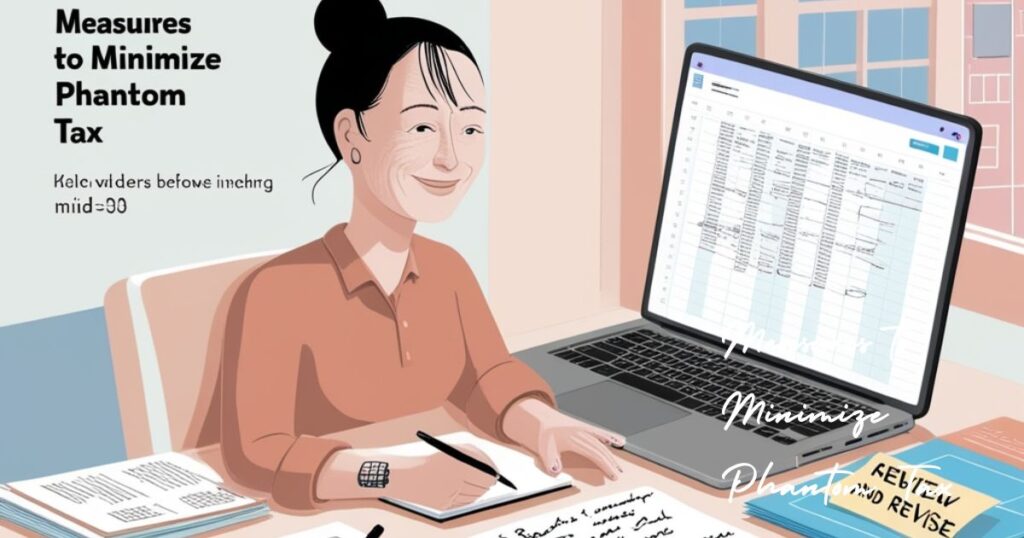In the complex world of income taxation, there’s a hidden specter that haunts both individuals and corporations alike: phantom tax. This enigmatic form of taxation often leaves taxpayers scratching their heads, wondering why they’re paying taxes on money they haven’t even seen.
But what exactly does phantom tax mean, and how can we minimize its impact on our financial lives? Let’s dive deep into this shadowy realm of finance and unmask the mystery of phantom tax.
What Does Phantom Tax Mean?
Phantom tax, also known as phantom income tax, is a peculiar beast in the world of income taxation. It’s a tax obligation that arises from paper profits or unrealized gains on assets, meaning you’re taxed on the appreciated value of investments even though you haven’t actually pocketed any cash from them. In essence, it’s a tax on income that exists only on paper – hence the ghostly moniker.
To truly grasp the concept of phantom tax, we need to understand a few key terms:
- Paper profits: These are theoretical gains that exist on financial statements but haven’t been realized through an actual sale.
- Unrealized gains: The increase in value of an asset that hasn’t been sold yet.
- Phantom income: Income that you’re taxed on but haven’t actually received in cash.
Phantom tax can materialize in various situations, including partnerships, stock options, and bonuses. It’s like being asked to pay for a meal you’ve ordered but haven’t eaten yet – the value is there on paper, but you haven’t truly experienced the benefit.
“Phantom tax is like a financial poltergeist – it can wreak havoc on your finances if you’re not prepared for its appearance.” – Anonymous Tax Advisor
Sources of Phantom Taxes

Now that we’ve defined phantom tax, let’s explore the various sources from which this spectral tax can arise. Understanding these sources is crucial for effective financial planning and tax management.
1. Unrealized Gains
Unrealized gains are perhaps the most common source of phantom taxes. Imagine you own stocks or real estate that have appreciated in value.
Even though you haven’t sold these assets and converted the appreciation into cash, the government might still expect you to pay taxes on the profits.
Case Study: The Stock Market Surge
Let’s say you bought 100 shares of XYZ Corp at $50 per share in January. By December, the stock price has soared to $100 per share. Your investment has doubled in value, creating an unrealized gain of $5,000.
Despite not selling any shares, you might be liable for taxes on this paper profit, depending on your specific tax situation and the type of account holding the investment.
2. Depreciation on Real Estate
For property owners, depreciation can be a double-edged sword. While it allows you to deduct expenses from your rental income for tax purposes, it can also lead to phantom income.
This occurs when the property’s actual cash flow is less than the taxable income reported after accounting for depreciation.
Example Scenario: You own a rental property that generates $10,000 in annual rental income. The yearly depreciation deduction is $2,000. On paper, your taxable rental income is $8,000.
However, if your actual expenses (mortgage, maintenance, etc.) total $9,500, you’re left with only $500 in real cash flow. Yet, you’re taxed on $8,000 – creating a phantom tax situation.
3. Mutual Fund Distributions
Mutual fund investors often encounter phantom taxes through capital gains distributions. Even if you don’t sell any shares, you might receive taxable distributions resulting from the fund manager’s portfolio activities.
How it works:
- The fund manager sells stocks within the fund that have appreciated.
- This triggers capital gains for the fund.
- These gains are distributed to shareholders.
- Shareholders must pay taxes on these distributions, even if they reinvest them.
4. Zero-Coupon Bonds
Zero-coupon bonds are a classic example of phantom income. These bonds are issued at a discount to their face value and don’t pay periodic interest. Instead, they appreciate over time until they reach their full face value at maturity.
The Phantom Tax Trap:
- You buy a $10,000 zero-coupon bond for $7,000 with a 10-year maturity.
- Each year, the bond’s value increases.
- You’re taxed on this increase annually, even though you won’t receive any cash until the bond matures in 10 years.
See Also: MTO E-Commerce North York Transaction
Impact of Phantom Tax

The impact of phantom tax can be significant, affecting both individuals and corporations in various ways.
For Individuals:
- Unexpected Tax Burden: Phantom taxes can create a tax liability without providing additional cash to pay it, potentially straining your finances.
- Cash Flow Challenges: You might need to liquidate other assets or dip into savings to cover phantom tax obligations.
- Complicated Financial Planning: Anticipating and accounting for phantom taxes adds another layer of complexity to personal financial planning.
For Corporations:
- Financial Reporting Complexities: Companies must accurately calculate and report phantom tax liabilities to avoid financial misstatements.
- Strategic Tax Planning Hurdles: Phantom taxes can complicate corporate tax strategies, requiring more sophisticated approaches to tax management.
- Potential Mismatches: There may be discrepancies between reported income and actual cash flows due to phantom tax effects.
Measures to Minimize Phantom Tax

While it’s challenging to completely avoid phantom taxes, there are strategies to minimize their impact on your financial situation. Here are some key measures to consider:
1. Regular Tax Planning
Proactive tax planning is crucial in managing phantom tax liabilities. This involves:
- Regularly assessing your financial portfolio
- Anticipating potential phantom tax events
- Developing strategies to offset or minimize tax impacts
Tip: Consider using tax planning software or working with a tax professional to stay ahead of potential phantom tax issues.
2. Diversification of Investments
Strategic diversification can help balance taxable income and withdrawals:
- Spread investments across various account types (e.g., Traditional IRAs, Roth IRAs)
- Consider tax-efficient investment vehicles
- Balance high-growth investments with more stable, income-producing assets
Example Portfolio Allocation:
| Asset Type | Allocation | Tax Consideration |
| Stocks | 40% | Potential for unrealized gains |
| Bonds | 30% | Regular interest income |
| Real Estate | 20% | Depreciation benefits |
| Cash | 10% | Low tax impact |
3. Estate Planning
Effective estate planning can help minimize phantom taxes for your heirs:
- Utilize trusts to manage asset transfer
- Consider gifting strategies to reduce estate size
- Plan for step-up in basis for inherited assets
“Estate planning isn’t just about distributing assets; it’s about optimizing the tax implications for the next generation.” – Estate Planning Expert
4. Consulting Tax Advisors
Professional guidance is invaluable in navigating the complexities of phantom taxes:
- Seek advice tailored to your specific financial situation
- Stay informed about changes in tax laws that might affect phantom tax liabilities
- Develop long-term strategies to manage and minimize phantom tax impacts
FAQs About Phantom Tax
To further clarify this complex topic, let’s address some frequently asked questions about phantom tax:
What should I do to avoid unexpected phantom taxes?
While it’s challenging to completely avoid phantom taxes, you can take these steps to minimize surprises:
- Regularly analyze your financial portfolio
- Consider tax implications before making investment decisions
- Work with a tax professional to create a proactive tax strategy
- Stay informed about potential sources of phantom income in your investments
Can I completely avoid phantom taxes?
Unfortunately, completely avoiding phantom taxes is often impossible. However, you can significantly reduce their impact through careful planning and strategic financial management. The key is to balance tax considerations with your overall investment goals and financial needs.
Do phantom taxes affect estate planning?
Yes, phantom taxes can have a significant impact on estate planning, particularly when it comes to assets with unrealized gains. Here’s how:
- Inherited assets may come with built-in tax liabilities
- Estate tax calculations can be complicated by phantom income
- Proper planning can help minimize tax burdens for heirs
Estate planning techniques that consider phantom taxes include:
- Setting up trusts to manage asset transfer
- Using gifting strategies to reduce estate size
- Planning for step-up in basis for inherited assets
What are phantom gains, and how are they related to phantom taxes?
Phantom gains are increases in the value of an asset that hasn’t been sold yet. They’re also known as unrealized gains. Here’s the relationship:
- Phantom gains represent the paper profit an asset has earned if it isn’t sold for cash.
- Phantom taxes are levied on these unrealized gains, even though no actual cash has been received.
- The tax is based on the market value of the unsold assets, creating a tax liability without a corresponding cash inflow.
Example:
You buy a stock for $1,000. Its value increases to $1,500, but you don’t sell. The $500 increase is a phantom gain, and you might owe taxes on this gain depending on your tax situation and the type of account holding the investment.
Conclusion
Phantom tax is a complex and often misunderstood aspect of income taxation that can significantly impact both individuals and corporations. By understanding what phantom tax means and its various sources – from unrealized gains and real estate depreciation to mutual fund distributions and zero-coupon bonds – you can better prepare for its financial implications.
While completely avoiding phantom taxes may be impossible, implementing strategies such as regular tax planning, diversifying investments, thoughtful estate planning, and consulting with tax advisors can help minimize their impact on your financial situation. Remember, the key to managing phantom taxes lies in proactive planning and staying informed about your tax liabilities.
As you navigate the shadowy realm of phantom taxes, keep in mind that every financial decision has potential tax implications. By staying vigilant and seeking professional advice when needed, you can unmask the mystery of phantom tax and take control of your financial future.

